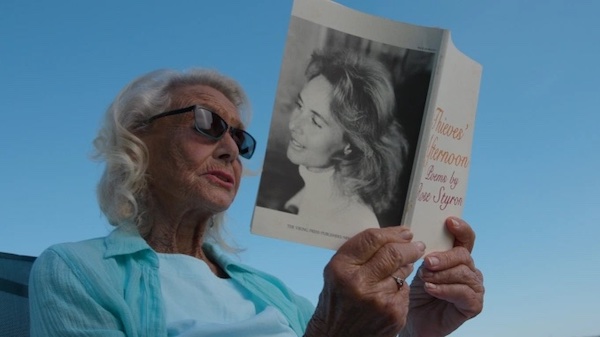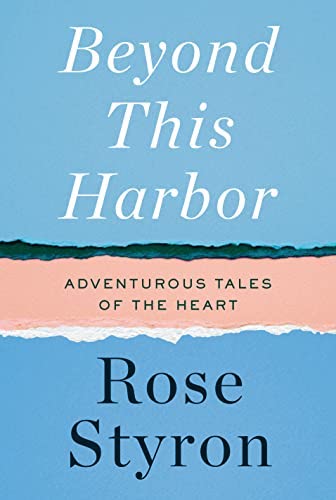Film Review: “In the Company of Rose” — The Rich Life of Rose Styron
By Gerald Peary
This very informal documentary grew out of cozy conversations over six summers, often on her porch, between Rose Styron and director James Lapine.

A scene from In the Company of Rose.
On an island that bows to its literary royalty, Martha’s Vineyard, Rose Styron reigns as the undisputed queen. “The Vineyard,” she calls it, and she should know, having lived there for half a century: year-round from 2013, alone since the 2006 death of William Styron, her author husband. When Bill Styron was alive, the most esteemed public figures — from Gabriel Garcia Marquez to the Clintons — would ferry over from the Massachusetts mainland to visit at their colonial house on the harbor in Vineyard Haven. JFK and Jackie brought their kids in a sailboat from Hyannis Port and all bedded down for the night at the Styrons. And let’s note a flock of Vineyard celebrity friends including Mike Nichols, Philip Roth, Arthur Miller, Diane Sawyer, Mike Wallace, Leonard Bernstein.
Also, there were the great and legendary parties on the Styrons’ massive lawn going down to the Atlantic waters; and, even without her husband around, Rose Styron has kept up the Gatsby-lite tradition. In James Lapine’s charming documentary In the Company of Rose, we observe Rose Styron working her way through the hundreds gathered on her lawn, totally at ease, calmly having a word for anyone she approached or who approached her. That was at age 91, and what a consummate party girl! Today, she’s 96 and has just published a memoir about her richly populated life, Beyond This Harbour: Adventurous Tales of the Heart.
The very informal film grew out of cozy conversations over six summers, often on her porch, between Rose Styron and Lapine, another Vineyard pal, the librettist and stage director of hit musicals by Stephen Sondheim (Into the Woods, Sunday in the Park With George) and others (Falsettos, Little Miss Sunshine). He may be a star in the theater world, but Lapine, as director of this documentary, readily admits he’s in awe of Rose Styron. He doesn’t hide that he has a bit of a crush on her. He can’t get over her composure, her social talents, and how she radiates a sunshine spirit. (And, my, she is attractive, in her ever-changing patrician preppy wardrobe! One could imagine Lauren Bacall playing her in a film.)
 But Styron sees herself in a far more modest way. She has published three books of adult poetry and one children’s volume but doesn’t obsess about their worth. In earlier years, she traveled the world for Amnesty International including frightening trouble spots like Nicaragua and Pinochet’s Chile, but she’s matter-of-fact about these accomplishments. She talks openly in the documentary about having had an abortion, but she seems proudest of becoming a mother to four (though, she fears, a too permissive one). To this day, Rose Styron has no regrets about being the one typing all of her husband’s manuscripts even as her poems languished in a drawer. She found William Styron’s literary output immensely interesting and was honored to be the first to have a look at what he’d written out longhand.
But Styron sees herself in a far more modest way. She has published three books of adult poetry and one children’s volume but doesn’t obsess about their worth. In earlier years, she traveled the world for Amnesty International including frightening trouble spots like Nicaragua and Pinochet’s Chile, but she’s matter-of-fact about these accomplishments. She talks openly in the documentary about having had an abortion, but she seems proudest of becoming a mother to four (though, she fears, a too permissive one). To this day, Rose Styron has no regrets about being the one typing all of her husband’s manuscripts even as her poems languished in a drawer. She found William Styron’s literary output immensely interesting and was honored to be the first to have a look at what he’d written out longhand.
The Styrons hooked up in the early 1950s. She was traveling to Rome for a stay. He was a Fellow at the American Academy, rewarded for the success of his first novel, Lie Down in Darkness (1951). Soon they were living together, and spontaneously married in 1953. The couple returned to American third-class on a boat, and William Styron became absorbed during the bumpy voyage penning his second book, Set This House on Fire (1960). The years ahead would be highlighted by his two major triumphs both as literature and for popularity and writer fame: The Confessions of Nat Turner (1967) and Sophie’s Choice (1979).
Though Rose Styron claims they never seriously contemplated divorce, their marriage was certainly a thorny one. By temperament, the spouses were opposites. Rose was/is an enormously social person and a committed mother, Bill a moody introvert with a fierce temper. Like many male high modernists, he had lots of children but, Rose says, was a lousy father. He resented his kids for interfering with what he valued most: his writing. Yes, there were affairs, Rose confesses, some one-nighters for her and presumably endless trysts for him. How did they get through it? Mostly don’t ask, don’t tell. But there were even more difficult problems for them. Bill Styron became victimized for a long spell by severe depression, so brilliantly described in his frank, telling Darkness Visible: A Memoir of Madness (1990). He was better for many years, and then, sadly, fell into depression for a second time. Rose Styron says that Bill felt destroyed, convinced that he had deceived his readers by the hopeful ending of Darkness Visible.
What regrets, Lapine asks, did Rose Styron have about the marriage? She answers, guiltily, that she was the one who had approved shock treatments for her husband’s second severe depression. Afterward, he never wrote another word of fiction, alleging that he had lost his ability to construct a narrative. And, she tells Lapine, she had made a grave mistake in their last years together. He wanted to confess the terrible things he had done and apologize, but she refused to rehash the past. “Don’t talk, don’t tell” still was her credo, so she didn’t allow a desperate William Styron to repent, to clear his soul.
The secret to Rose Styron’s longevity, besides excellent genes? Probably, for good or bad, it’s her extraordinary steely stoicism. It got her somehow through Bill Styron’s affairs, temper fits, and most of all, his many years of depression. Rose was in New York City when she got a phone call to say that her husband was dying in a hospital on the Vineyard. She tried to get back there but island travel was blocked by a strong storm. So what to do? She returned to her life as usual and, though suffering deeply, went to a New York party.
Gerald Peary is a Professor Emeritus at Suffolk University, Boston; ex-curator of the Boston University Cinematheque; and the general editor of the “Conversations with Filmmakers” series from the University Press of Mississippi. A critic for the late Boston Phoenix, he is the author of nine books on cinema; writer-director of the documentaries For the Love of Movies: The Story of American Film Criticism and Archie’s Betty; and a featured actor in the 2013 independent narrative Computer Chess. His latest feature documentary, The Rabbi Goes West, co-directed by Amy Geller, has played at film festivals around the world.
Tagged: Beyond This Harbour: Adventurous Tales of the Heart, James Lapine, Rose Styron

Darkness Visible was a powerful evocation of depression. Not much light at the end of that tunnel unfortunately.
I work in the substance abuse field and it is still sad to me that “depression” becomes the umbrella term and that the extensive use of addictive substances (that change people’s personalities over time, mostly robbing them of maturity) are simply ignored in the mix, so to speak.